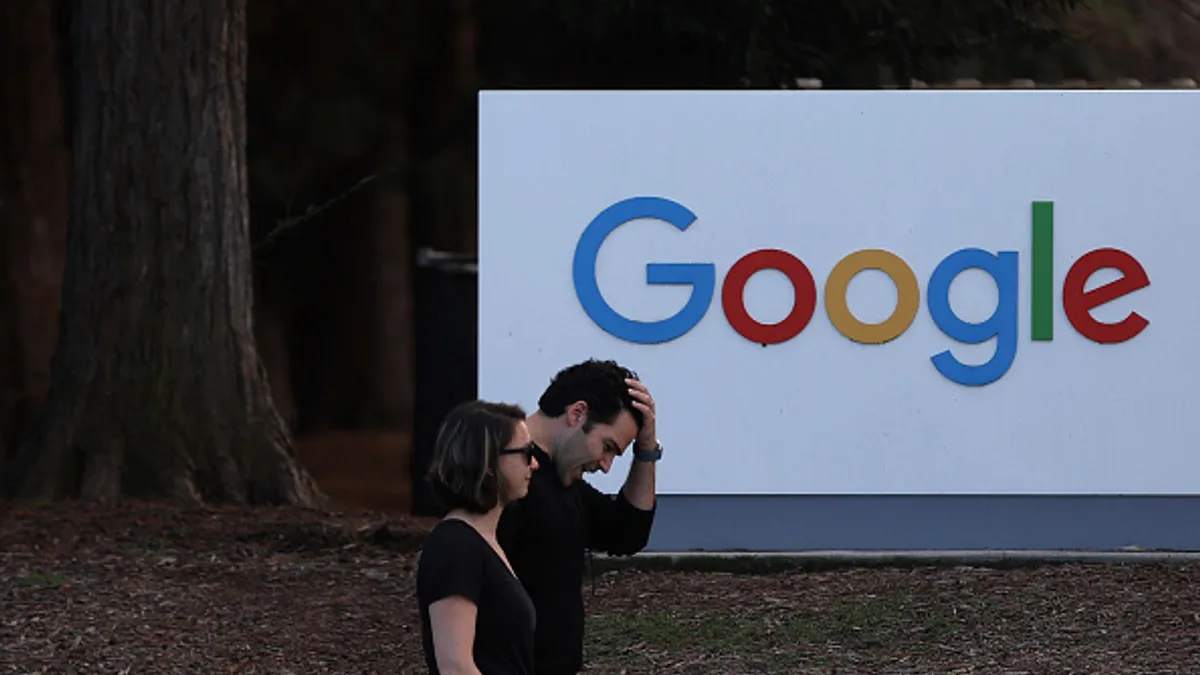Dive Brief:
- Google topped revenue expectations in Q1, with its ad business raking in $66.89 billion, according to an earnings statement from parent Alphabet. However, executives warned of mild headwinds gathering due to macroeconomic volatility.
- Search, Google’s largest ad segment, grew revenue 9.8% year over year to $50.7 billion, led by spending from financial services brands followed by retailers. YouTube was up 10.3% to $8.9 billion for the period, driven by demand for direct response and brand ads.
- Despite the strong start to the year, Google is contending with the dual threats of macroeconomic uncertainty, which could dent ad spending, and an antitrust crackdown focused on its search and ad-tech offerings.
Dive Insight:
Google’s Q1 revenue overall totaled $90.2 billion, up 12%, delivering a stronger-than-expected quarter that saw the company bounce back from a holiday period in which its core advertising engines experienced a rare slowdown. The momentum at the beginning of the year may be challenged as the company contends with potentially weaker appetites for ad spending from marketers that are embroiled in tariff chaos. Whether Google will need to break off important aspects of its business, including its Chrome web browser and valuable ad-tech assets, remains an open question as well.
Digital platforms like Google and Meta have in recent years benefited from a surge in advertising activity from Asia-Pacific (APAC) retailers, including Temu and Shein, that have found favor with U.S. shoppers on the hunt for cheap goods. But recent analysis has suggested that those companies have pulled back due to tariffs, including on channels like paid search that represent Google’s bread and butter. Analysts at MoffettNathanson believe Meta, the owner of Facebook and Instagram, stands to lose up to $7 billion in advertising revenue this year due to the Trump administration’s tariffs. Meta reports its Q1 earnings on April 30.
Google executives emphasized that it is too early to say what the true impact of the macroeconomic volatility will be, but acknowledged that there could be some weakness in what was until recently a robust spending category.
“I mean, we’re obviously not immune to the macro environment, but we wouldn’t want to speculate about potential impacts beyond noting that the changes to the de minimis exemption will obviously cause slight headwind to our ads business in 2025, primarily from APAC-based retailers,” said Chief Business Officer Philipp Schindler on a call discussing the Q1 results with analysts. Schindler added that Google is well-versed in navigating periods of uncertainty.
Beyond macro factors, Google is also contending with a mounting number of regulatory threats. The search giant late last week was ruled to wield an illegal monopoly on ad-tech publisher tools and ad exchanges — though not display advertising — with remedies still being sorted out. Last year, the company was found to have a monopoly on the search market, with proposed remedies including a spinoff of Chrome. While these changes would be disruptive, not all analysts are convinced they would bring down the top dog in digital advertising.
“Google’s results reinforce the view that, even in the event Google were forced to divest the business units targeted by antitrust advocates, the direct financial impact would be minimal relative to the strength of its core businesses,” said Andrew Frank, vice president distinguished analyst at Gartner, in emailed comments on the earnings report. “Although the structural impacts are harder to assess, the performance should give Google's business customers some reassurance regarding Google's durability.”
Google has made other moves of late that carry weighty implications for advertisers. This week, it announced it would keep third-party cookies in Chrome rather than create a standalone device for opting in or out of using the controversial tracking technology. The news puts a nail in the coffin of a yearslong saga that set off a mad scramble for alternatives and left many marketers in a holding pattern. Google did not discuss cookies or Chrome on the Q1 earnings call.
“The earnings news effectively turns the page,” said Frank of cookie deprecation.















